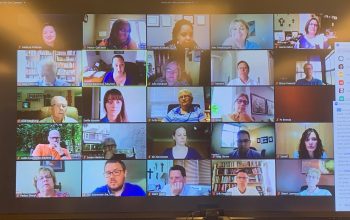By John Mai
Community building is challenging during a pandemic. Churches thrive when people are gathered together and, for the past four months, religious leaders have had to figure out how to thrive when people are gathered through computer screens, phone calls, or parking lots.

A Zoom call offers an opportunity to share information and commit to common action for community change.
In response to these obstacles, the Minneapolis Area Synod has reimagined the adult forum. Traditionally, you might find yourself attending one of these on a Sunday afternoon after a church service. Speakers present on a relevant issue, give time for questions and discussion, and maybe even give attendees some action steps that they can take to rally behind this issue. To continue to spur fellowship and education, the synod’s organizing department has taken these components of adult forums and presented them as an online series called “Answering the Call: Leading with Love.”
Emilie Bouvier, director of organizing for the synod, designed this monthly series to best meet the needs of its attendees. She believes that it provides an opportunity for people to see new and familiar faces “in a moment where folks are hungering to be connected.”
Bouvier admits that it was difficult to have expectations for “Answering the Call,” which is now three months underway. It has ventured into new territory for the organizing department. Congregations, groups, teams, and coalitions in the world of community organizing depend on networking and outreaching to accomplish their goals, and the COVID-19 pandemic has challenged organizers to do outreach in new ways.
“Answer the Call provides an opportunity for people to see new and familiar faces ‘in a moment where folks are hungering to be connected.’”
Mercy Taban, speaker for the second forum in this series, understands the practicality of this reality. As the co-organizer for the Northsiders Engaged in Equitable Development (NEED) Coalition, Taban spoke to forum attendees about gentrification and displacements in North Minneapolis. She addressed the impact of rent increases, over-policing, and redlining in communities of color.
Taban believes that “raising awareness of issues is central to what the [NEED] coalition does.” It helps ensure that organizing campaigns are not self-serving, but rather are “community-centered,” Taban says.
THE SYNOD’S ADULT FORUMS are not complete without providing the opportunity for action. Sara Nelson-Pallmeyer, executive director of Exodus Lending, presented at the first forum in this monthly series. Exodus Lending is a nonprofit that offers assistance to those who are caught in the debt trap of payday loans. Exodus’ work, created to serve vulnerable individuals in economic distress due to predatory loans, must be community-centered. After educating forum attendees about the crisis of predatory lending, Nelson-Pallmeyer provided accessible and effective action steps for the attendees to rally behind.
This combination of education and action is the core of why the “Answering the Call” series exists. In the middle of a pandemic, Bouvier and the organizing department recognized the desire for people to be actively connected in their community. In this way, she saw the opportunity for long-term synod work to intersect with rapid community engagement.
“After educating forum attendees about the crisis of predatory lending, Nelson-Pallmeyer provided accessible and effective action steps for the attendees to rally behind.”
Alvin Dungan, a member at Transfiguration Lutheran Church in Bloomington, is a perfect example of the intersection between long-term synod work and rapid community engagement. He has attended all three forums in the series, and was particularly drawn to the topic of the first forum: fair lending practices. Predatory lending was something that Dungan’s Bible study had begun talking about before the pandemic, so he jumped at the opportunity to learn more.
Synod organizers encouraged the forum’s attendees to email Minnesota Governor Tim Walz about the matter, and Dungan followed through. He states, “If we don’t keep these things out in front of our elected officials, they fall through all sorts of cracks.”
Bouvier echoes Dungan: “The [action] steps are crucial, and having people involved in them is part of what makes organizing work.” For this reason, Bouvier states that this series is a “powerful vehicle we hope to continue.” The synod organizing department wants to continue to educate and call to action passionate community members, whoever they may be.
Forums are held monthly in the early evening. Contact Emilie Bouvier at e.bouvier@mpls-synod.org to receive more information about upcoming forums.
